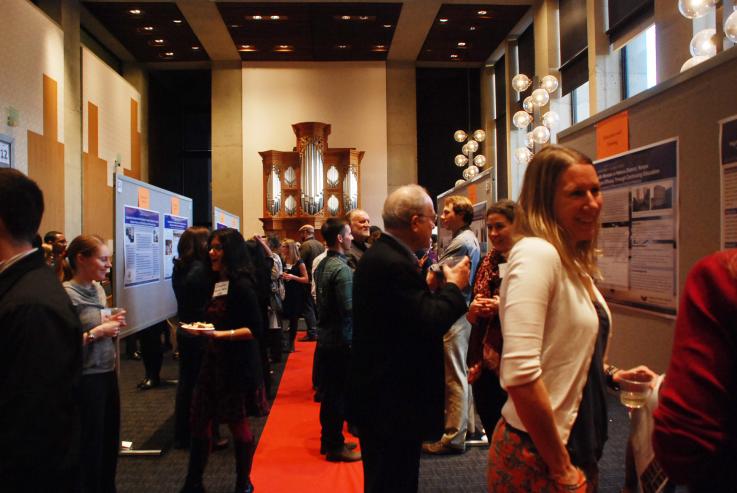By Bobbi Nodell and Amelia Vader | Department of Global Health
MARCH 7 -- Complete with red carpet and paparazzi, six students were awarded “Global Healthies” awards for outstanding achievement in global health March 6.
The inaugural Global Healthies award ceremony, held in Kane Hall, awarded students in six categories, including the People’s Choice Oscar Gish Social Justice Award. Each awardee received $500.
More than 30 projects were displayed in a poster event before the ceremony, allowing people to vote for the Oscar Gish award.
Mariel Boyarsky, MPHc, received the Oscar, for her work on “Women’s Health and Safety in Rwenzururu Kingdom.” For her master’s practicum, Boyarsky worked with an MPH student at Makere University in Uganda, to identify the maternal health problems and assets in Rwenzururu Kingdom, a coffee growing region in the far western edge of Uganda. The project was funded by Health Alliance International and Atlas Coffee in Seattle.
“The opportunity to interview women in Uganda and hear their stories about giving birth, the difficulties and pain and trauma, was unbelievable,” Boyarsky said. She encouraged people to buy fair trade coffee to increase income among the community.
Nearly 50 students submitted applications, and awardees were selected by faculty review committees with expertise in the respective categories.
The Global Healthies awards were made possible by generous gifts from individual donors. The Oscar Gish award was provided by Patrick Ryan in honor of Gish, a University of Washington faculty member who passed away in 2004. As an economist, author and scholar, Oscar Gish was an advocate for social justice and equality. He was known as an expert on international health policies, and influenced both students and faculty alike to strengthen their commitment to social justice.
King Holmes, the chair of the Department of Global Health, opened an envelope before each awardee, smiled, and said, “And the Global Healthie goes to….”
Discovery and Development
Aditya S. Khanna, Post-doctoral fellow, Global Health, who works for UW’s International Clinical Research Center, won for his project: “Lifelong Antiretroviral Therapy for Prevention of Mother-to-Child Transmission of HIV has Potential to Decrease Adult HIV Incidence Due to Sexual Transmission.”
UW’s International Clinical Research Center conducted the largest study on the benefit of using antiretroviral therapy for HIV prevention among people who are not infected.
Education and Training
Kristen Savage, MPH student, Health Services, and a fellow with the Strengthening Care Opportunities through Partnership in Ethiopia (SCOPE) program, won for her project: “Soul Fathers as Health Educators: A Pilot Project to Improve Antenatal Care and Prevention of Mother-to-Child Transmission Uptake in Gondar, Ethiopia.”
Savage said in Gondar, where priests outnumber doctors 250:1, SCOPE is engaging the Coptic Church to help improve the health of community members.
Implementation and Action
Arianna Rubin Means, PhD student, Implementation Science, won for her project: “Developing an Operational Research Consortium within the Neglected Tropical Diseases Community.” Arianna is a Research Analyst for the Bill & Melinda Gates Foundation Neglected Infectious Disease team. Previously, she worked on projects through the Department's Strategic Analysis, Research & Training Program (START).
Public Health and Direct Care
Cynthia Simekha, Undergraduate student in Public Health with a Global Health Minor, won for her project: “Barriers in Medicaid Enrollment among Somali Immigrants.”
Simekha, a student from Kenya, worked with several groups in Ohio -- Ohio State University, College of Public Health; Ohio Commission on Minority Health; Somali Community Association of Ohio; and Our Helpers Community Center -- to look at ways to improve access to medical care for immigrants.
Lab Sciences
Russell Barlow, PhD student, Pathobiology, won for his project: “Vaccinated Breakthrough Pertussis Infections among Children and Adolescents Result in Decreased Illness Severity and Duration, Oregon 2010-2012.”
Barlow, an epidemiologist, found that vaccinations reduce the severity of whooping cough symptoms. He said he was sharing his award with people he worked with in laboratory sciences.
To learn more about how philanthropy can fuel and sustain this important work, please contact Chris Wronsky, Interim Assistant Dean for Advancement, UW School of Public Health, Wronsky@uw.edu, 206.221.6395, or Deirdre Schwiesow, Assistant Director for Corporate and Foundation Relations, UW Medicine Advancement, deirdres@uw.edu, 206.221.4769
